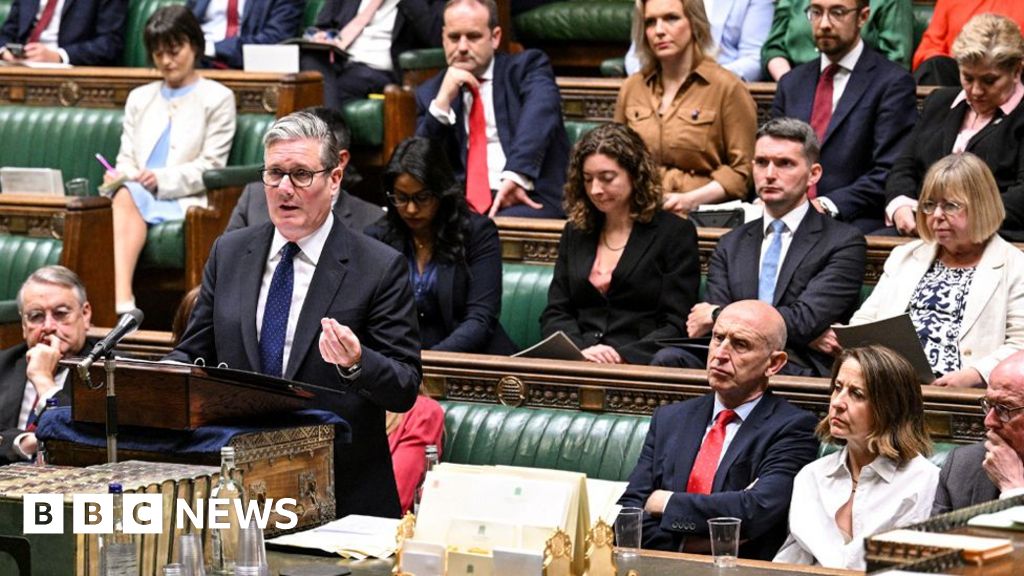Three U-turns in a month. First, there was theslow-motion change of mind on the winter fuel paymentfor millions of pensioners. Then there was thedecision to hold a statutory inquiry into grooming gangs, having previously said one wasn't necessary. And nowthison benefits. Ministers argue their decision on setting up an investigation into the scale of child sexual abuse by men often of Pakistani heritage came about after they had commissioned a considered piece of work by Dame Louise Casey - and that was a pragmatic sequencing of decision making, albeit under considerable political pressure. But the other two are more straight forward U-turns: decisions of the government's own making they later concluded were deeply unpopular. This latest one, on the welfare state, comes after Sir Keir Starmer has enduredhis bumpiest days yet in Downing Street. He was publicly humiliated by coach-loads of his own MPs in a well-executed campaign while he was out of the country at the Nato summit in the Netherlands. The scale of it, and its remorseless growth over the last 48 to 72 hours, nigh on guaranteed his eventual capitulation. The alternative was defeat. But this shouldn't have come as a surprise. Labour MPs have been telling myself and others for months they didn't like these plans - and more and more of them were making their views known both publicly and privately within the party. The government was determined not to budge, perhaps hopeful much of it was noise and their mountainous majority would inoculate them from a minority of grumblers. The prime minister is determined to leverage that majority to take on what he sees as the difficult changes the country desperately needs. The benefits bill is rising fast and he, the Chancellor Rachel Reeves and others believe the only way to protect the welfare state and ensure it is sustainable into the long term is to at least limit the scale of its growth. But the grumblers got louder, more numerous and more organised. And Downing Street found out the hard way their plans were doomed. By Thursday evening, multiple sources were telling me the concessions were agreed and were big, and the outline of the about-turn was spelt out. But it was only formally confirmed at half past midnight on Friday morning. In addition to the anger and uncertainty that this saga has caused for so many benefits recipients, there are two potentially long-lasting political consequences: for the Treasury's spreadsheets and the prime minister's authority. Projecting economic competence and a firm grip of the public finances runs to the core of the image Reeves wants to project as chancellor. These cuts were, in part at least, about doing just that. But now all the numbers are changing. And as for Sir Keir Starmer's authority, moments like this can leave a lasting impression, on a prime minister's own MPs and the country at large. No 10 had rapidly concluded this about-turn was their least worst option. But this isn't meant to happen to a government with a landslide majority and certainly not one less than a year into its time in office.
Chris Mason: A hat-trick of U-turns – and this is the most awkward of the lot
TruthLens AI Suggested Headline:
"UK Government Faces Series of Policy U-Turns Amid Internal Dissent"
TruthLens AI Summary
In recent weeks, the UK government has experienced a series of significant U-turns, highlighting the challenges it faces in maintaining its policy agenda amid political pressure. Initially, the government reversed its stance on winter fuel payments for pensioners, followed by a decision to conduct a statutory inquiry into grooming gangs, which had previously been deemed unnecessary. The latest reversal concerns the welfare state, where ministers had initially resisted calls for an investigation into child sexual abuse but were compelled to act after mounting pressure from within their own ranks. This decision to pivot comes as Labour leader Sir Keir Starmer faced a tumultuous period, marked by public dissent from his MPs regarding the government's welfare plans. The backlash was particularly pronounced while Starmer was abroad, leading to a swift realization that the government's previous approach was untenable. As Labour MPs increasingly vocalized their discontent, it became clear that the government's efforts to push through unpopular policies were faltering under scrutiny.
The implications of these U-turns extend beyond immediate policy adjustments, potentially affecting the government's credibility and the Chancellor's economic strategy. With the benefits bill rising, the government initially aimed to implement cuts as a means to ensure the sustainability of the welfare state. However, the backlash from within the party and the broader public led to a rapid reassessment of these plans. By late Thursday, reports indicated that significant concessions were in the works, culminating in a formal announcement at midnight on Friday. This situation not only raises questions about the government's ability to project economic competence but also poses risks to the Prime Minister's authority, especially given the significant majority the government holds in Parliament. Such internal dissent and the need for rapid policy shifts can leave lasting impressions on both party members and the electorate, complicating the political landscape for the government moving forward.
TruthLens AI Analysis
You need to be a member to generate the AI analysis for this article.
Log In to Generate AnalysisNot a member yet? Register for free.
